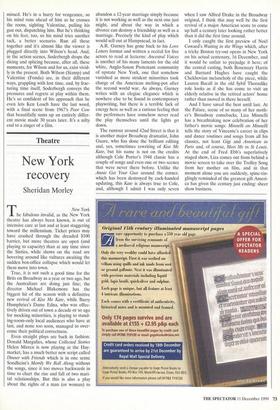Theatre
New York recovery
Sheridan Morley New York The fabulous invalid, as the New York theatre has always been known, is out of intensive care at last and at least staggering toward the millennium. Ticket prices may have crashed through the dreaded $100 harrier, but more theatres are open (and playing to capacity) than at any time since the Sixties, while shows on the road are hovering around like vultures awaiting the sudden box-office collapse which would let them move into town.
True, it is not such a good time for the Brits on Broadway as a year or two ago, but the Australians are doing just fine; the director Michael Blakemore has the biggest hit of the season with a definitive new revival of Kiss Me Kate, while Barry Humphries's Dame Edna, who was effec- tively driven out of town a decade or so ago for mocking minorities, is playing to stand- ing-room-only local audiences who have at last, and none too soon, managed to over- come their political correctness.
Even straight plays are back in fashion: Donald Margulies, whose Collected Stories Helen Mirren is now playing at the Hay- market, has a much better new script called Dinner with Friends which is in one sense Sondheim's Merrily We Roll Along without the songs, since it too moves backwards in time to chart the rise and fall of two mari- tal relationships. But this is also a play about the rights of a man (or woman) to abandon a 12-year marriage simply because it is not working as well as the next one just might, and about the way in which a divorce can destroy a friendship as well as a marriage. Precisely the kind of play which would sell out at Hampstead, in fact.
A.R. Gurney has gone back to his Love Letters format and written a recital for five actors to read at lecterns: Ancestral Voices is another of his many laments for the old white, Anglo-Saxon Protestant community of upstate New York, one that somehow vanished as more strident minorities took charge of the American melting-pot after the second world war. As always, Gurney writes with an elegiac elegance which is nowhere else to be found in contemporary playwriting, but there is a terrible lack of energy here as well as a curious feeling that the performers have somehow never read the play themselves until the lights go down.
The rumour around 42nd Street is that it is another major Broadway dramatist, John Guare, who has done the brilliant editing and, yes, sometimes rewriting of Kiss Me Kate, but his name is not on the credits although Cole Porter's 1948 classic has a couple of songs and even one or two scenes that were never there before. Unlike the Annie Get Your Gun around the corner, which has been destroyed by cack-handed updating, this Kate is always true to Cole, and, although I admit I was only seven when I saw Alfred Drake in the Broadway original, I think this may well be the first revival of a major American score to come up half a century later looking rather better than it did the first time around.
I only caught the first preview of Noel Coward's Waiting in the Wings which, after a tricky Boston try-out opens in New York on his actual centenary, 16 December, and it would be unfair to prejudge it here; of the central casting, both Rosemary Harris and Barnard Hughes have caught the Chekhovian melancholy of the piece, while Lauren Baca11 in the old Sybil Thorndike role looks as if she has come to visit an elderly relative in the retired actors' home rather than moved in there herself.
And I have saved the best until last. At the Palace, scene of so many of her moth- er's Broadway comebacks, Liza Minnelli has a breathtaking new celebration of her father's movie songs: Minnelli on Minnelli tells the story of Vincente's career in clips and dance routines and songs from all his classics, not least Gigi and American in Paris and, of course, Meet Me in St Louis. At the end of Fred Ebb's superlatively staged show, Liza comes out from behind a movie screen to take over the Trolley Song from her mother on film, and in that moment alone you are suddenly, spine-tin- glingly reminded of the greatest gift Ameri- ca has given the century just ending: sheer show business.


























































































 Previous page
Previous page